Cryptocurrency Futures – Learn How to Trade Cryptocurrency Futures Today!
Please note that we are not authorised to provide any investment advice. The content on this page is for information purposes only.
Please note that we are not authorised to provide any investment advice. The content on this page is for information purposes only.
Cryptocurrency futures allow you to trade digital assets without taking ownership of the underlying tokens. This comes with several benefits – such as not needing to worry about wallet storage, low fees, and the ability to open a long or short position. In most cases, you can also trade cryptocurrency futures with leverage.
In this guide, we explain how cryptocurrency futures work and which online trading platforms allow you to access this speculative marketplace.
Table of Contents
If you’re looking to trade cryptocurrency futures right now – follow the step-by-step guide below to get started in under five minutes. Take note, the guide below will show you how to trade crypto CFDs – which work in the same way as futures and are readily accessible for retail clients.
Take note, unlike traditional cryptocurrency futures, CFDs at eToro never expire. As such, you don’t need to worry about the position being closed in three months’ time – should you wish to keep it open for longer!
Cryptoassets are highly volatile unregulated investment products. No EU investor protection. 67% of retail investor accounts lose money when trading CFDs with this provider.
In order to trade cryptocurrency futures, you will need to have an account with a suitable broker or exchange. Below you will find an overview of the best places to trade cryptocurrency futures right now.
There is quite a disparity between each of the three cryptocurrency futures platforms listed above – so you will find full reviews further down in this guide.
Cryptoassets are highly volatile unregulated investment products. No EU investor protection. 67% of retail investor accounts lose money when trading CFDs with this provider.
In a nutshell, cryptocurrency futures allow you to trade popular digital assets like Bitcoin and Ethereum without taking ownership of the underlying tokens. Instead, you will be trading a financial derivative – which is tasked with tracking the real-world price of the respective cryptocurrency.

It should be noted that cryptocurrency futures are typically reserved for institutional clients – as they are complex financial products that often require a large minimum investment. However, as we cover in more detail shortly, there are several alternative ways for retail clients to access cryptocurrency futures markets from the comfort of home.
Nevertheless, cryptocurrency futures give you a lot more flexibility when it comes to speculating on the future value of digital assets.
As a retail client, the best way to access the cryptocurrency futures market is via a CFD (contract-for-difference) – we will cover this in more detail shortly.
If you’re completely new to cryptocurrency futures – it is important that you first do some homework before risking any capital. After all, not only will you be trading speculative and volatile asset classes like digital currencies – but futures themselves are highly complex financial instruments.
With this in mind, the sections below will explain everything there is to know about cryptocurrency futures – which includes the following core topics:
Let’s start with identifying a cryptocurrency futures market.
The first thing to assess when learning how to trade cryptocurrency futures is the specific market that the contract relates to. In the vast majority of cases, you will be trading BTC/USD – which is the most liquid cryptocurrency pair in this industry.
As such, if you will be trading cryptocurrency futures for the very first time – it might be best to stick with BTC/USD.
This particular metric can be a major stumbling block for causal traders wishing to buy and sell cryptocurrency futures. The reason for this is that in the traditional futures scene – the minimum contract size is typically very high. For those unaware, this refers to the number of assets that you need to buy or sell for each contract that is traded.
It goes without saying that most of you reading this guide will not seek to risk $200,000 on a cryptocurrency futures position. Fortunately, there are ways around this, as some exchanges – albeit, unregulated, offer cryptocurrency futures with a very small minimum contract size.
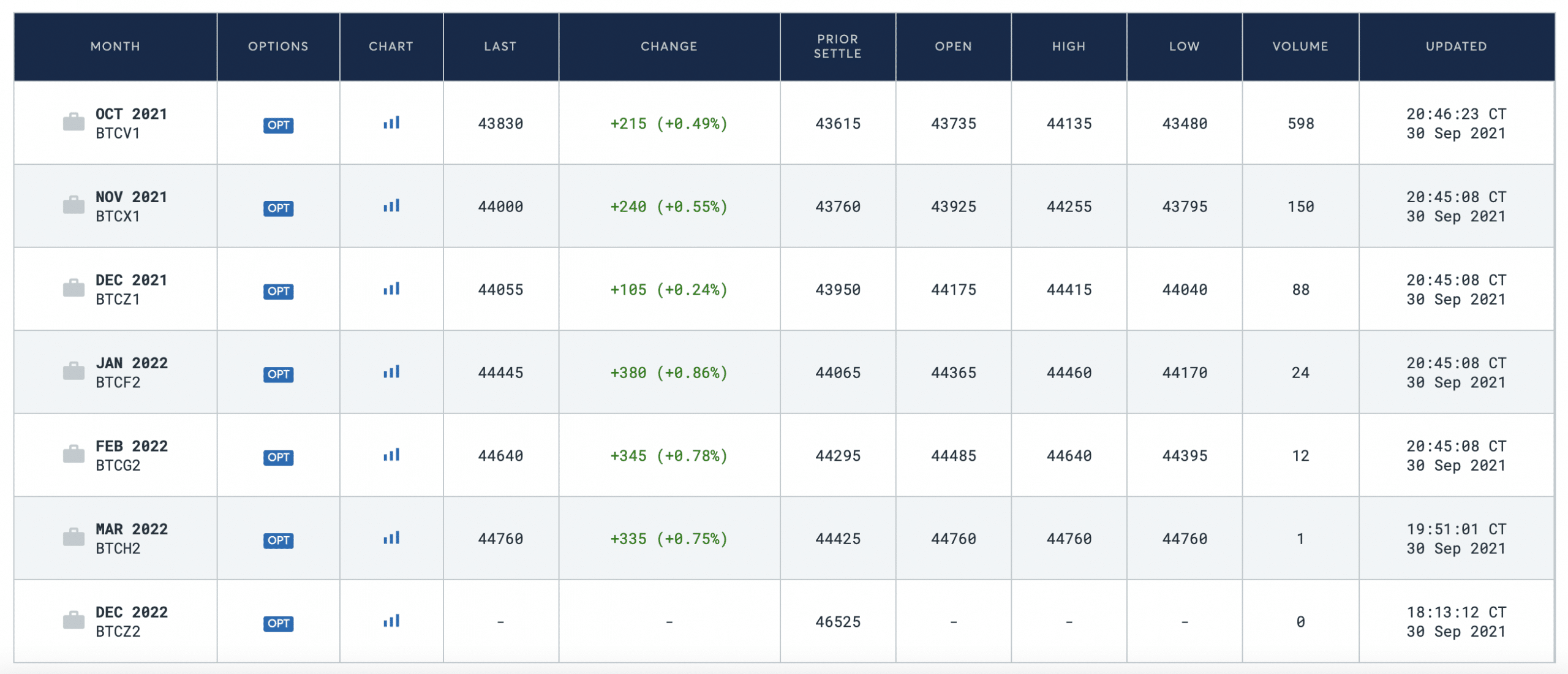
You also have CFDs at regulated brokers like eToro, which operate in the same way as futures. This is because CFDs allow you to trade cryptocurrencies without taking ownership, with leverage, and to choose from a long or short position. Plus, at eToro, the minimum stake is just $25!
The next thing to understanding when learning how to trade cryptocurrency futures is the contract duration and expiry. As we briefly noted earlier, traditional futures contracts will come with an expiry date – which usually runs on 3-month cycles.
This is where things get interesting. In the traditional Bitcoin futures market, some providers will settle the contract in digital currency. This means that if you are long on BTC/USD and are still holding the contract when it expires – you will need to take ownership of the Bitcoin. As a casual trader, this is likely something that you do not want to do.
Once again, this is why we much prefer CFDs – as the contract never expires. This means that you hold your leveraged cryptocurrency trade for as long as you wish – and never have to worry about the trade being closed.
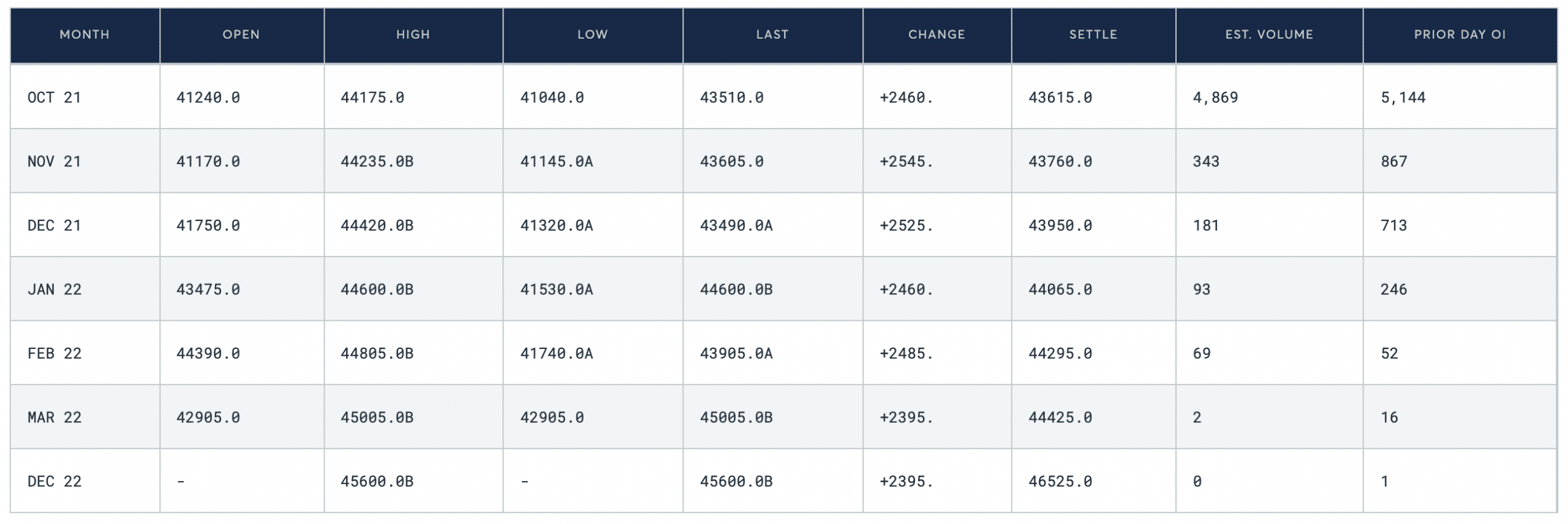
You might also come across ‘perpetual’ futures contracts at exchanges like Binance and OKEx. Although these cryptocurrency futures do not come with an expiry date – they are offered by unregulated providers.
Once you have established the contract size and expiry date of the cryptocurrency futures market – you then need to spend some time assessing the strike price. This is what makes futures different from trading spot markets, insofar that the strike price will be different to the current value of the respective digital asset.
This is because the strike price is based on the perceived value of the cryptocurrency once the futures contract expires. This is determined by market forces as per most other financial instruments.
For example:
The strike price of the futures contract will naturally increase and decrease throughout the day – based on market conditions. For example, if there is a positive news story released that concerns Bitcoin, then you can expect the strike price of the futures contract to increase.
Similarly, if negative news about Bitcoin surfaces, the opposite is likely to happen. As we cover shortly, your profit or loss when trading cryptocurrency futures will be determined by the strike price and the value at which the contract is sold.
One of the biggest benefits of trading cryptocurrency futures is that you will always have the option of going long or short. In a nutshell, this gives you the opportunity to profit from both rising and falling market prices.
For instance:
This offers a great level of flexibility, especially when it comes to bear markets. That is to say, if you think that the wider digital asset markets are set to go through a period of bearishness, you can attempt to profit from this by going short on a cryptocurrency futures contract.
In addition to being able to go long or short, cryptocurrency futures also support leverage. This means that you can trade cryptocurrency futures, you can enter a position worth more than you have in your brokerage account. The amount of leverage on offer will be determined by a variety of factors – such as:
To give you an idea of the specifics, unregulated exchanges like Kraken will give you access to Bitcoin futures markets at a leverage of up to 1:50. In simple terms, this means that if you were to open a position worth $10,000 – you would only need to put up $200.
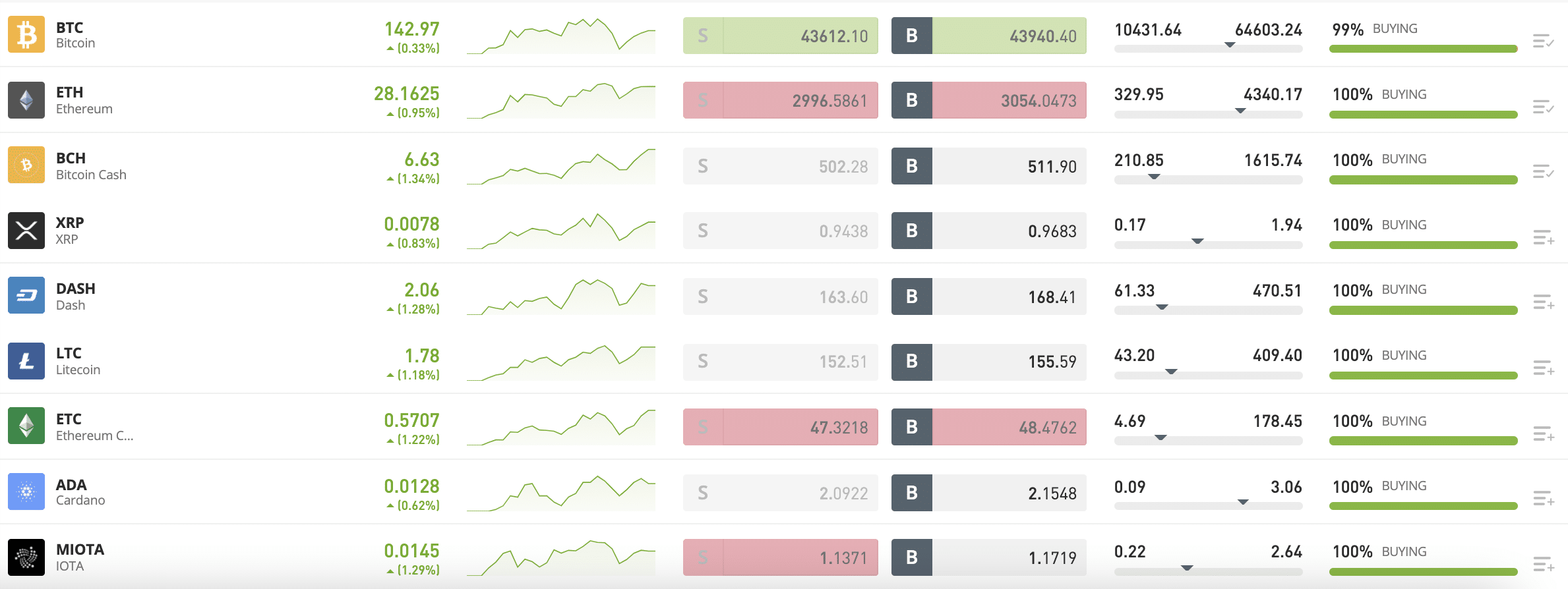
Although this might seem like easy money, if the cryptocurrency futures position moves against you by a certain amount – the exchange would be forced to close your trade. This means that the provider would keep your stake – which in this example, amounts to $200.
On the other hand, you can also trade cryptocurrencies with leverage at a regulated brokerage site like eToro. As you will be trading CFDs, the contracts never expire and you still have the option of going long or short. As a regulated entity, the amount of leverage that eToro can offer you will be based on the factors discussed above.
So now that we have covered the main contract specifications of cryptocurrency futures – we can now dig a little bit deeper into the fundamentals of profits and losses. Perhaps the best way to help you understand these core metrics is to run you through a detailed example.
As per the above specifics, you think that Bitcoin will be worth less than the $39,000 strike price when the contracts expire in three months. Therefore, you decide to go short on BTC/USD futures and choose a total stake of 100 contracts.
Now let’s see how this cryptocurrency futures trade plays out.
As you can see from the above, you were able to offload your cryptocurrency futures contracts before the expiry date. This is something offered by most, but not all, brokers in this space. it’s best to check this before you sign up with a platform, as you don’t want to be lumbered with the contracts when a suitable exit point arises.
Throughout this guide, we have briefly touched on the benefits of trading CFDs – as opposed to traditional futures contracts – especially if you are a retail client. There is a full range of reasons why this is the case – which we explain in the sections below.
Ultimately, if your main objective is speculative on the future value of digital assets with leverage – and have the capacity to go long or short, then CFDs are by far the better option than cryptocurrency futures.
So now that you have a firm understanding of how to trade cryptocurrency futures, the next step is to find a suitable broker or exchange. Our research team put in countless hours to find the best places to access cryptocurrency futures – and you will our findings below via our in-depth reviews.
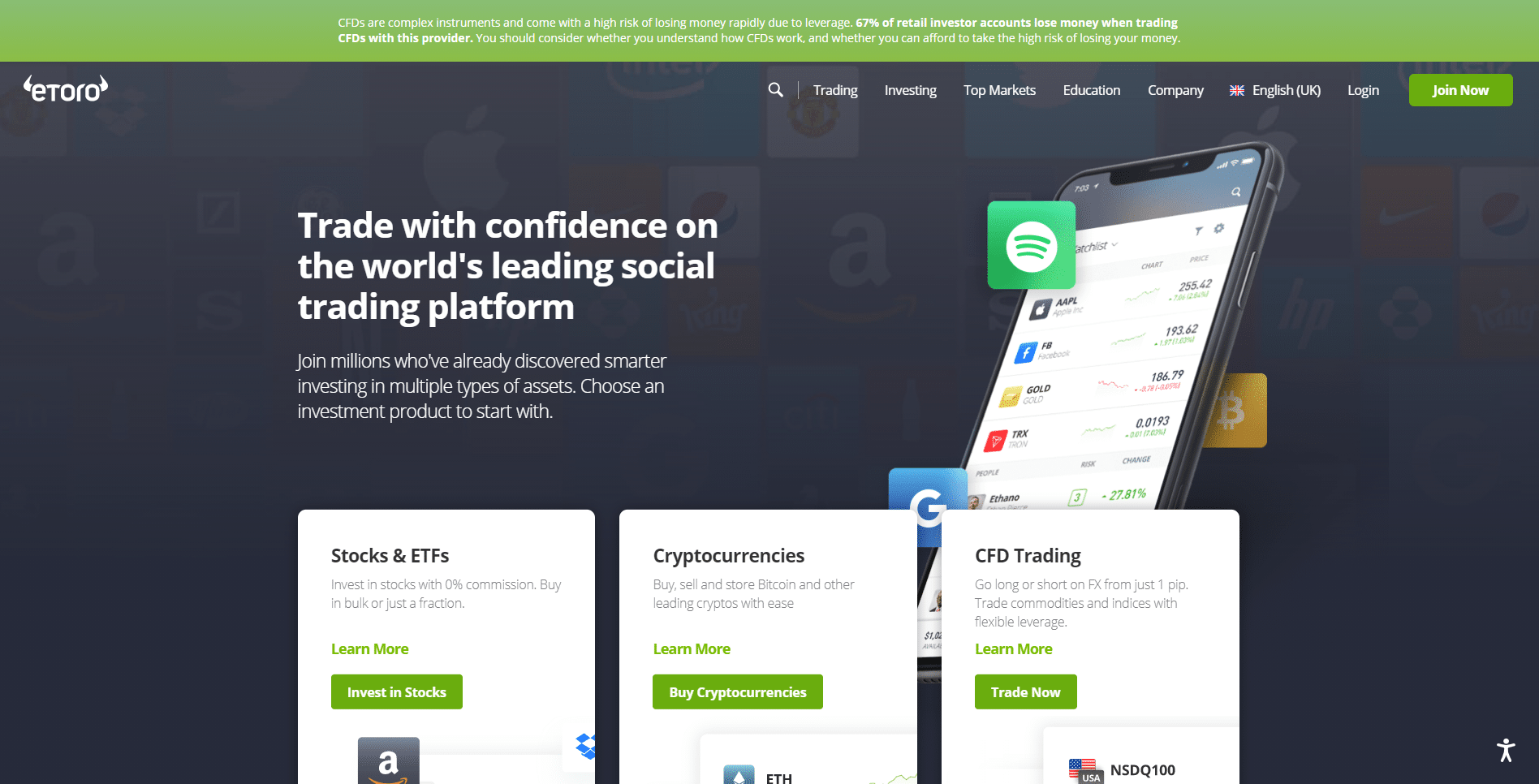
eToro is an online broker that is now used by over 20 million clients around the world. Although this brokerage site does not specifically offer cryptocurrency futures, it does allow you to trade CFDs. As noted earlier, this means that you can speculate on the future value of your chosen digital asset without needing to take ownership of the underlying tokens. Plus, CFDs never expire, so you don’t need to worry about contract settlement dates.
Most importantly, cryptocurrency CFDs at eToro can be traded with leverage and both long and short orders are supported. In terms of available markets, eToro offers a wide range of cryptocurrency pairs. In terms of crypto-to-fiat markets, you can trade everything from Bitcoin, Ethereum, EOS, Ripple, Litecoin, and AAVE, and more against the US dollar. You can also trade digital assets against other fiat currencies – such as the British pound, euro, and Japanese yen.
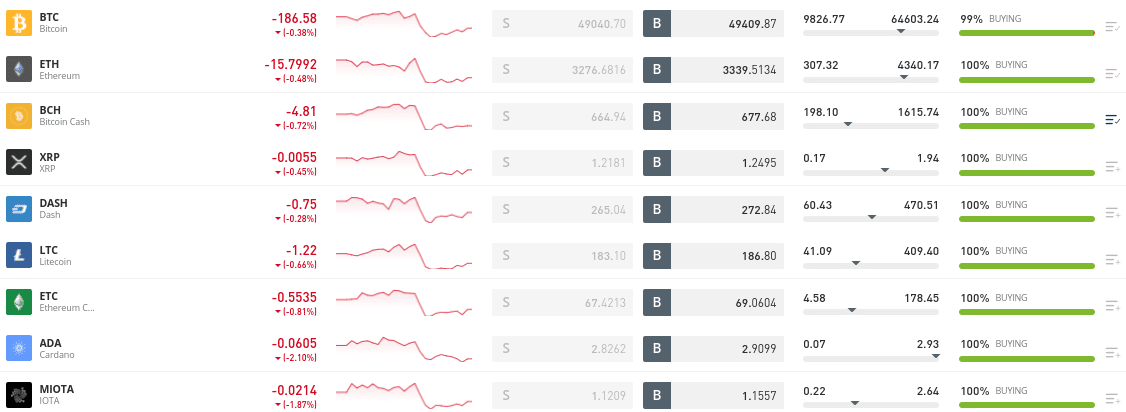
If you’re looking to trade crypto-cross pairs, eToro also has you covered. This includes the likes of BTC/EOS, ZEC/LTC, ETH/EOS, ETH/XLM, and more. All cryptocurrency markets on the eToro platform can be traded from just $25 per stake. This is in stark contrast to traditional cryptocurrency futures – which often require a minimum balance of $100,000 or more. Fees are super competitive at eToro too – which is a major advantage of choosing this broker.
For example, you can deposit funds on a fee-free basis if you’re from the US. Non-USD deposits attract a small fee of 0.5%. This is the case across debit/credit cards, e-wallets like Paypal and Neteller, ACH, online banking, and more. Trading fees at eToro simply amount to the spread – which is the difference between the buy and sell price of the cryptocurrency you are trading (starts at 0.75%). In addition to manual cryptocurrency trading, eToro also offers passive investment tools.
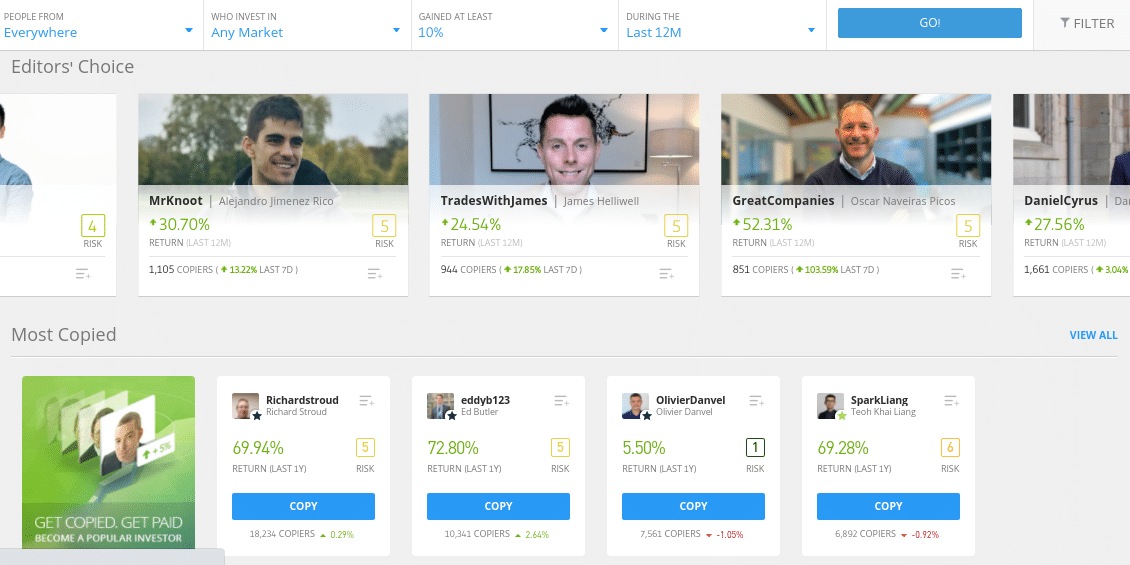
For instance, the Copy Trading tool gives you access to thousands of verified investors that use the eToro platform to trade. You can choose an investor that you like the look of and elect to copy all of their future trades like-for-like. The most important thing to note about eToro is that the broker is authorized and regulated by some of the most reputable financial bodies in this industry. This includes the SEC (US), FCA (UK), ASIC (Australia), and CySEC (Cyprus).
Pros
Cons
Cryptoassets are highly volatile unregulated investment products. No EU investor protection. 67% of retail investor accounts lose money when trading CFDs with this provider
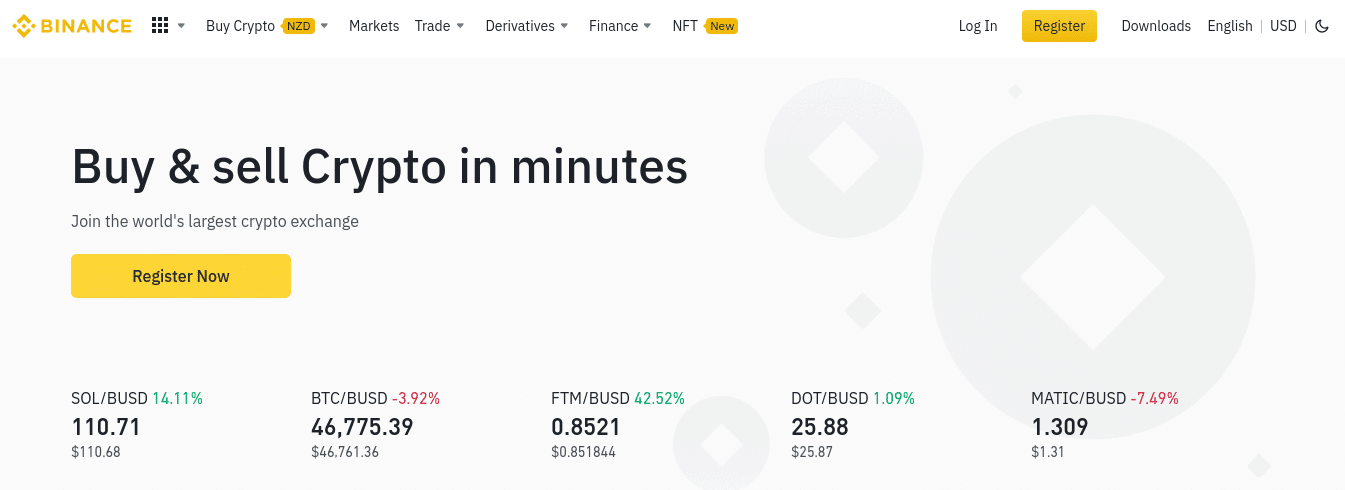
Binance is an online cryptocurrency exchange that offers a wide variety of trading products. This includes traditional spot market trading, options, saving accounts, and even cryptocurrency futures. Regarding the latter, Binance offers a huge variety of futures markets to choose from – so traders of all skill sets should be covered. For example, the platform allows you to choose from quarterly or perpetual futures. While the former has a 3-month duration, the latter never expires.
The Coin-M futures at Binance at settled in digital currencies. The USD-M Futures are instead settled in USDT or BUSD. In terms of supported markets, Binance allows you to trade a large selection of cryptocurrency futures. For example, you can speculate on the future value of Bitcoin, Stellar, Ripple, Chainlink, Tron, and more. Binance also offers leveraged cryptocurrency futures – with limits depending on the respective market. For example, you can short-sell Cardano with leverage of up to 4x.
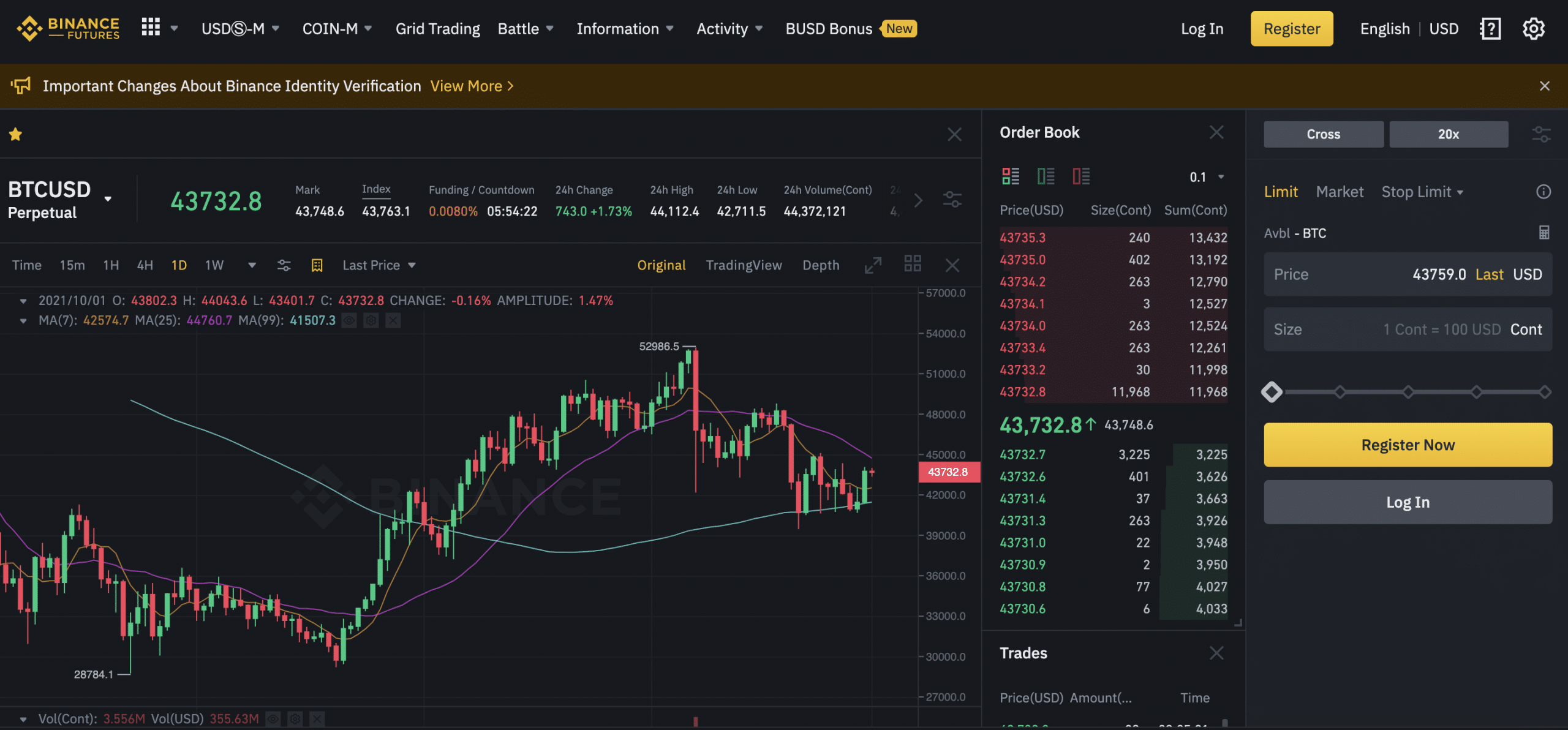
Another major advantage of choosing Binance is that it offers super competitive fees. For instance, entry-level traders will pay a maximum market taker fee of just 0.004% when buying and selling cryptocurrency futures. Deposits via crypto are free – however, debit/credit card transactions can cost up to 4% – depending on where you live. US clients do get a better deal though, as they are charged just 0.5% when adding funds via Visa or MasterCard. Take note, Binance is not regulated – so tread with caution.
Pros
Cons
at eToro, #1 Broker in the Crypto Space
Cryptoassets are highly volatile unregulated investment products. No EU investor protection. 67% of retail investor accounts lose money when trading CFDs with this provider
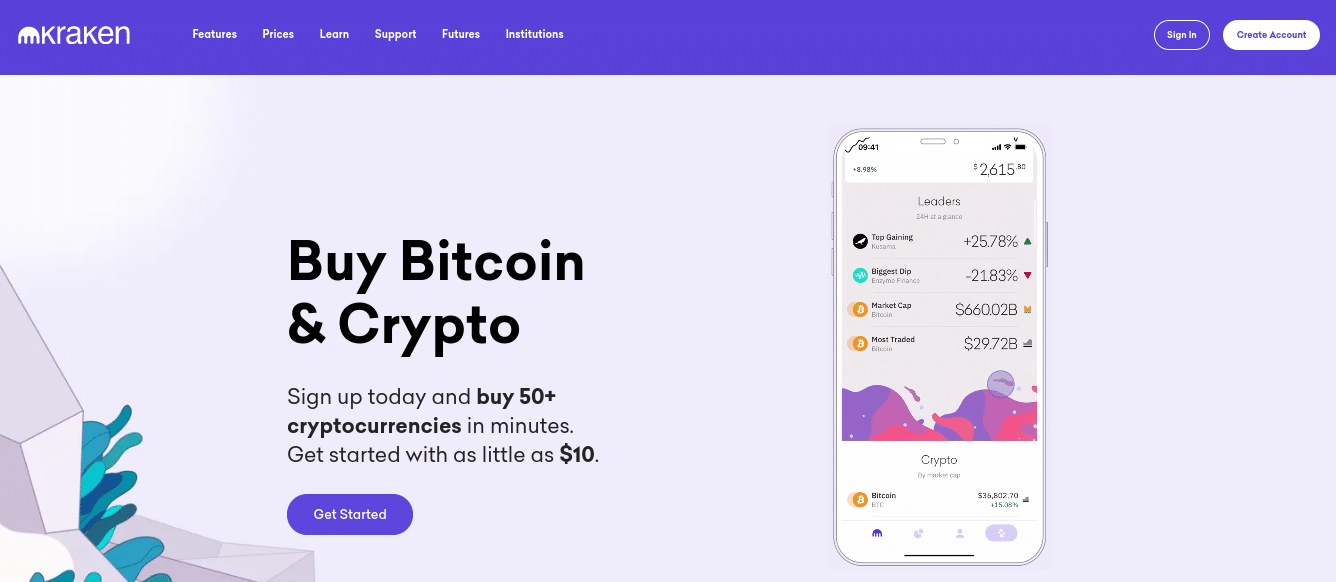
Kraken is another popular cryptocurrency exchange with millions of clients on its books. In a similar nature to Binance, Kraken offers a wide range of cryptocurrency markets. This includes the ability to buy digital currencies with fiat money (debit/credit cards and bank transfers), as well as trade crypto-asset spot markets. Kraken also offers a fully-fledged cryptocurrency futures department that covers 7 markets. This covers the ability to trade Bitcoin, Ethereum, Litecoin, Bitcoin Cash, and Ripple against the US dollar.
You can also trade Bitcoin and Ethereum futures that are priced in euros. Each of the aforementioned cryptocurrency futures markets comes with a contract size of 1 USD. As such, this will suit inexperienced traders that wish to buy and sell cryptocurrency futures with a small amount of capital. Many traders flock to the Kraken futures platform as leverage of up to 50x is available. This means that a stake of $100 can potentially be amplified to $5,000.
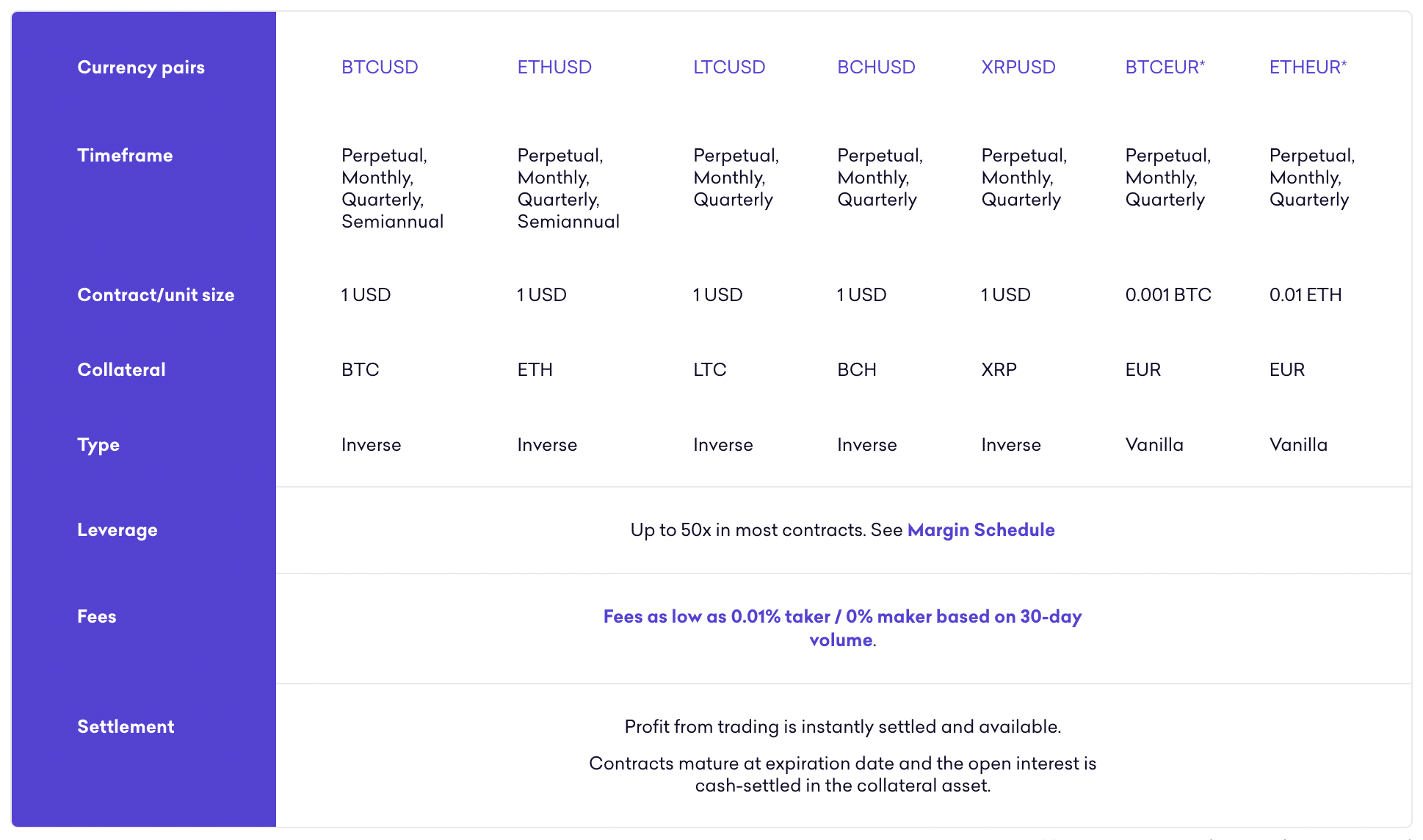
When it comes to fees, cryptocurrency futures at Kraken can be traded in a relatively low-cost environment. For example, if your 30-day trading volume is less than $100,000, you will pay a market taker fee of 0.05%. The lowest fee on offer stands at 0.01%, but this would require a 30-day volume of over $100 million. You also need to factor in the funding rates applied to leveraged futures trades at Kraken, which are charged every four hours. This will vary depending on the market, stake, and the amount of leverage being used.
Pros
Cons
at eToro, #1 Broker in the Crypto Space
Cryptoassets are highly volatile unregulated investment products. Proceed at your own risk.
In this section of how our guide on cryptocurrency futures, we are going to show you how to get started with a trade in under five minutes. However, as we have explained throughout this page, retail clients are much better suited for CFDs as opposed to cryptocurrency futures.
This is because CFDs offer a safe and regulated arena for casual traders that wish to buy and sell leveraged cryptocurrencies in a low-cost environment.
The first step is to visit the eToro website and open an account. You will be asked to choose a username and a strong password, and enter your mobile number and email address. Next, you will be asked to provide your full name, nationality, home address, and date of birth.
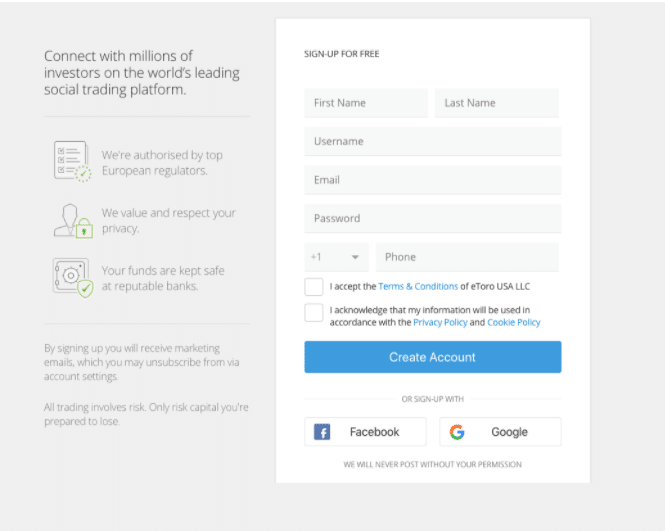
As eToro is regulated by a number of reputable financial bodies – you will also be asked to upload a copy of your ID. This can be a government-issued ID card, passport, or driver’s license.
Cryptoassets are highly volatile unregulated investment products. Proceed at your own risk.
You will now be able to make a deposit into your newly created eToro account.
This top-rated brokerage accepts the following payment methods:
The minimum deposit for US clients is $50 (no fee) and $200 (0.5% fee) for most other nationalities.
Once you have made a deposit, you can then search for the cryptocurrency market that you wish to trade. eToro offers a wide variety of crypto-to-fiat and crypto-cross pairs – so it might be worth using the search box.
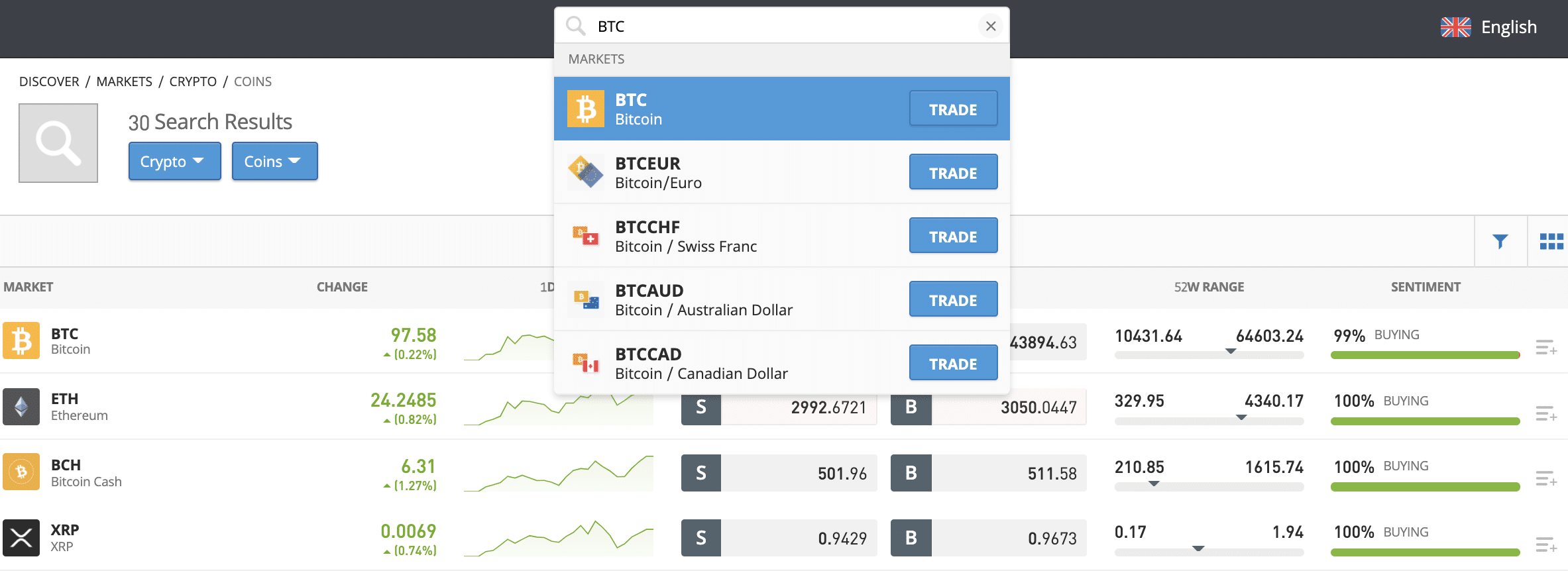
In our example above, we are looking to trade BTC/USD.
Once you hit the ‘Trade’ button next to the market that interests you – an order box will appear. This will require you to choose from a buy or sell order, depending on whether you think the crypto market will increase or decrease in value. You also need to specify your stake ($25 minimum) and whether or not you want to trade with leverage.
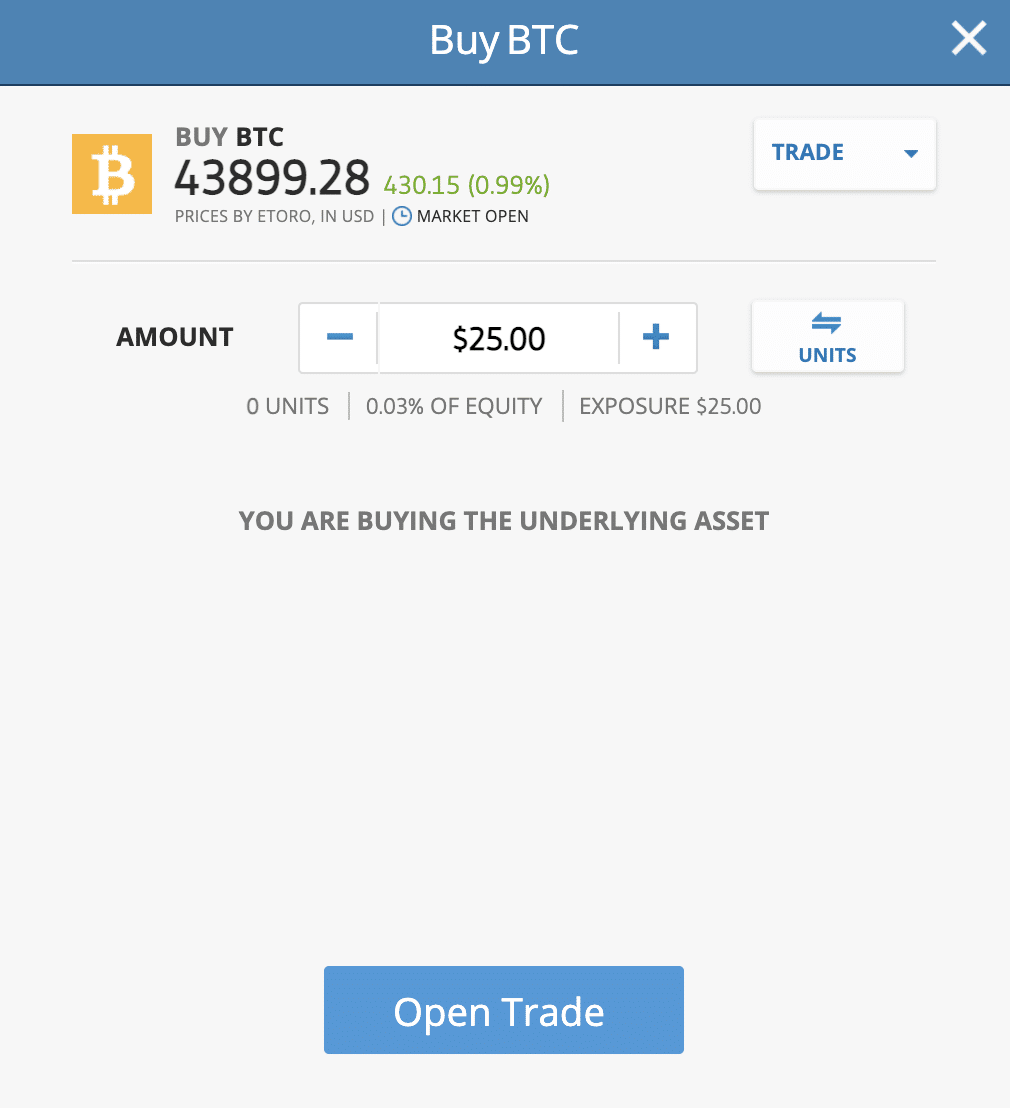
To place your order, click on the ‘Open Trade’ button. As noted earlier, CFDs never expire – so you can keep your cryptocurrency position open at eToro for as long as you wish.
In summary, cryptocurrency futures are popular with traders that wish to speculate on digital currencies in a more sophisticated manner. This is because futures permit leverage, short-selling, and numerous advanced trading strategies.
However, this segment of the regulated trading arena requires a large amount of capital – so retail clients will be more suited for CFDs. This financial instrument operates in the same way as futures – as you won’t need to own the underlying tokens, you can apply leverage, and even short-sell. However, CFDs do not expire – nor do they require a huge capital balance.
To get started with your first leveraged crypto trade at regulated broker eToro – you can open a position in under five minutes by creating an account and making an instant deposit with your debit/credit card or e-wallet.